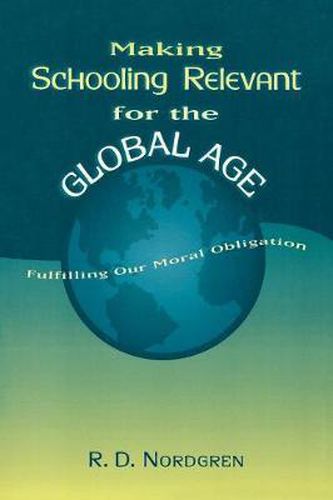Readings Newsletter
Become a Readings Member to make your shopping experience even easier.
Sign in or sign up for free!
You’re not far away from qualifying for FREE standard shipping within Australia
You’ve qualified for FREE standard shipping within Australia
The cart is loading…






In Making Schooling Relevant for the Global Age, R.D. Nordgren, Ph.D. contends that America’s schools are failing to prepare our children for the global economy as well as failing to develop citizens willing and capable of sustaining the type of democracy necessary to coexist in the Global Village. Our schools are, in fact, industrial-age relics. In the past two decades, K-12 schooling reforms have led to the accountability movement and the subsequent standards movement that have sought to bribe and punish schools into doing more of the same instead of producing world-class educations for our children.
In order for schooling to become relevant in the global age, the currently used curricula, teaching strategies, and school structures need to be discarded; and more important, the way we think about schools and schooling must change. In essence, a distinctly different model of schooling needs to be conceptualized and implemented across the U.S. In Making Schooling Relevant for the Global Age, Nordgren offers such a model based, in part, on schooling he observed in Sweden; one that is supported by pertinent social, economic, and educational research. The global age of shifting national boundaries and economic influences requires a new set of skills or traits for its citizens and its workers. These must be fostered in our schools if our nation is to provide its people with the opportunities to succeed in the post-industrial economy as well as make us a model of social justice to be emulated by the rest of the world.
$9.00 standard shipping within Australia
FREE standard shipping within Australia for orders over $100.00
Express & International shipping calculated at checkout
In Making Schooling Relevant for the Global Age, R.D. Nordgren, Ph.D. contends that America’s schools are failing to prepare our children for the global economy as well as failing to develop citizens willing and capable of sustaining the type of democracy necessary to coexist in the Global Village. Our schools are, in fact, industrial-age relics. In the past two decades, K-12 schooling reforms have led to the accountability movement and the subsequent standards movement that have sought to bribe and punish schools into doing more of the same instead of producing world-class educations for our children.
In order for schooling to become relevant in the global age, the currently used curricula, teaching strategies, and school structures need to be discarded; and more important, the way we think about schools and schooling must change. In essence, a distinctly different model of schooling needs to be conceptualized and implemented across the U.S. In Making Schooling Relevant for the Global Age, Nordgren offers such a model based, in part, on schooling he observed in Sweden; one that is supported by pertinent social, economic, and educational research. The global age of shifting national boundaries and economic influences requires a new set of skills or traits for its citizens and its workers. These must be fostered in our schools if our nation is to provide its people with the opportunities to succeed in the post-industrial economy as well as make us a model of social justice to be emulated by the rest of the world.